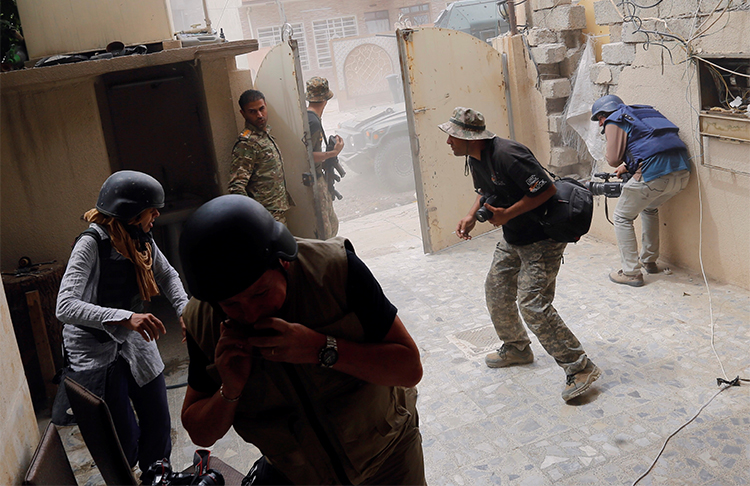Threats to journalists in Iraq have changed after government forces regained control over the city of Mosul and significantly reduced the territory controlled by the militant group Islamic State. CPJ’s Emergencies Response Team (ERT) has issued the following advisory for journalists who plan to continue working in Iraq.
Despite the decline of the Islamic State group’s presence in Iraq, the country is no more stable. The reemergence of Shia militias is blurring defined front lines and has elevated general risks for journalists in the region.
The Hashd al-Shaabi, or Popular Mobilization Units (PMUs), have played a key role in the fight against Islamic State and, in recognition of their work, the Iraqi parliament has designated them an official military force. In this new landscape, journalists will be required to get approval from these groups as well as the government, depending on where they plan to work.
Many of these newly approved armed groups have poor human rights records, according to a Human Rights Watch report published in July 2016. The New York-based group has documented summary killings, enforced disappearances, torture, and the destruction of homes by some of these factions, and has called on Iraqi authorities to stop operating alongside these militias.
There are concerns that these groups could turn to violence as a means to censor reporting on corruption, violence, abuse or human rights violations.
In December 2016, a group of gunman affiliated with a Shia militia kidnapped Afrah Shawqi al Qaisai from her home and held her for nine days after the Iraqi journalist wrote an article criticizing an interior ministry official and the culture of impunity surrounding militia groups.
While Islamic State has suffered territorial losses, the militant group still remains a threat to journalists working in Iraq. It still controls Tel Afar, a city 39 miles (63 kilometers) west of Mosul, and surrounding areas.
Currently, Iraqi troops, with support from Kurdish Peshmerga forces and PMUs, are waiting for official orders to start a ground offensive to retake Tel Afar. Iraqi troops are already carrying out airstrikes on Islamic State and have stationed military equipment in Badush, 25 miles (40 kilometers) northwest of Mosul. Some of the area’s villages have already been retaken.
Islamic State also maintains support among parts of the population in Iraq’s western Anbar province. In recent weeks, there has been an uptick in attacks that use guerrilla tactics, a trend that security experts say is likely to continue. Islamic State is expected to continue targeting media as well.
Here are some tips for journalists working in Iraq. They are intended as guidance and may not fit all situations.
General advice:
- Have a clear understanding of which militias or armed forces control the areas where you will be working and determine if media presence will be welcome.
- Obtain necessary permissions that may vary with each militia group. Failure to have the proper credentials can lead to altercation or arrest.
- Create a contingency plan with an emergency contact. Set up a communication schedule with your contact and agree on actions to be taken should you fail to check in at the appropriate time. In high-risk situations, journalists should consider tracking devices.
- As part of your contingency plan, leave your passport or other identification details, insurance policy numbers, medical history, and blood type with your emergency contact.
- If you will be at risk of kidnapping or arrest, agree on proof of life questions with your emergency contact. Also provide him or her with passwords for social media and personal wishes regarding media coverage and ransoms. In such situations, it is also advisable to leave instructions regarding power of attorney in the event that you go missing or become incapacitated.
- Your emergency protocols in case of injury, arrest or kidnapping should include contact information of people in your network, i.e. your fixer or local journalists. Leave their contact information with your emergency point person. Also include contact information of your country’s local embassy or consulate.
CPJ encourages local journalists, freelancers, and media organizations covering the Mosul offensive to closely follow the safety principles and practices of the ACOS alliance, which can be found here.
For more information on conditions for journalists working in Iraq, visit CPJ’s Iraq page on our website. For additional safety information and details including security assessments, visit CPJ’s Journalist Security Guide.
